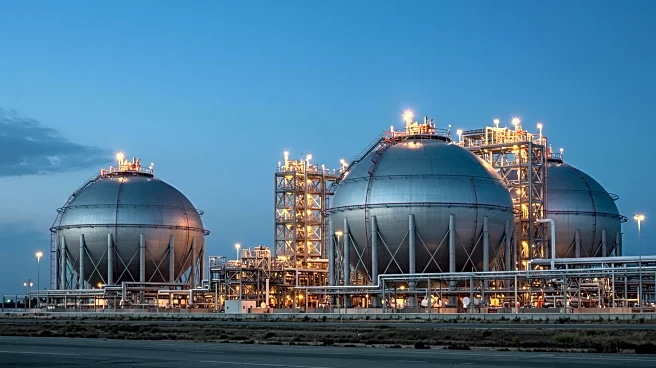What is the story about?
What's Happening?
The U.S. Department of Energy, led by Secretary Chris Wright, has granted an extension to Energy Transfer’s Lake Charles LNG Export Company, LLC, allowing more time to commence exports of liquefied natural gas (LNG) to non-free trade agreement countries. The Lake Charles LNG project, located in Lake Charles, Louisiana, is being developed from an import terminal into an export terminal. Once completed, it will have the capacity to export up to 2.33 billion cubic feet per day of natural gas as LNG. The project has secured several long-term off-take contracts with major companies such as Chevron and Kyushu Electric Power Company. The United States, under President Trump's administration, has approved projects capable of exporting over 13.8 billion cubic feet per day of natural gas, positioning the country as the largest global producer and exporter of natural gas.
Why It's Important?
The extension granted to Lake Charles LNG reflects the growing global demand for American LNG, driven by recent trade negotiations and the need for secure energy sources. This development is significant for the U.S. energy sector, as it supports the expansion of LNG exports, which are crucial for maintaining the country's leadership in the global energy market. The project is expected to create jobs and contribute to lowering energy costs domestically. Additionally, the ability to export LNG to non-FTA countries enhances the U.S.'s strategic energy partnerships and economic influence worldwide. Companies involved in the LNG supply chain, including those in construction, shipping, and energy, stand to benefit from the increased export capacity.
What's Next?
As the Lake Charles LNG project progresses, stakeholders will be monitoring the construction timeline and the fulfillment of off-take agreements. The project's success could lead to further investments in LNG infrastructure and technology, potentially influencing future energy policies. The Department of Energy will continue to play a pivotal role in facilitating LNG exports, balancing domestic energy needs with international market demands. The global energy landscape may see shifts as other countries respond to the increased availability of U.S. LNG, potentially affecting international energy prices and trade dynamics.
















